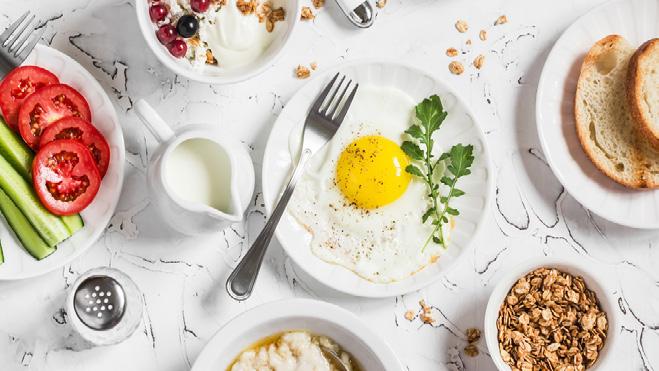
3 minute read
Cod Loin with Pepper,Tomato, and Olives
This 20 minute recipe is healthy, nutritious, and most importantly, delicious!
Ingredients
Advertisement
3 tbsp extra virgin olive oil
1 clove garlic, peeled and crushed
1 red onion, peeled and cut into half moons
2 romano peppers, deseeded and cut into strips
800g cherry vine tomatoes, soaked in boiling water for 2 minutes, then peeled and chopped
2 tbsp tomato purée
180g black olives
700g cod loin, cut into 4 pieces
55g wild rocket
Method
Step 1
Preheat the oven to 180C/160F. In a large pan, sauté the garlic, onion and peppers in the olive oil for 5 minutes until they start to soften. Add the tomatoes, purée and olives. Cover and simmer for 15 minutes then season to taste.
Step 2
Meanwhile, put the cod on a foil-lined oven tray, drizzle with olive oil and grind over some black pepper. Bake for 12-15 minutes, depending on thickness.
Step 3
Serve the fish with the sauce and a scattering of rocket.

Tips for Healthy Eating
In addition to focusing on nutrient-rich foods, there are several other ways you can help maintain a healthy diet:
Stay Hydrated: Dehydration can sneak up on seniors, as the sensation of thirst diminishes with age. It is crucial to drink plenty of fluids throughout the day to maintain hydration levels. Water is the best choice, but herbal teas, infused water, and low-sodium broths are also excellent options. Keep a water bottle nearby as a reminder to sip regularly and aim for at least 8-10 cups of fluids per day, adjusting for individual needs based on factors like activity level and climate.
Portion Control: With age, the body’s calorie needs tend to decrease due to changes in metabolism and activity levels. Seniors need to be mindful of portion sizes to prevent overeating and maintain a healthy weight. Using smaller plates and bowls can create the illusion of a fuller plate while naturally reducing portion sizes. Additionally, aim to fill half of your plate with fruits and vegetables, one-quarter with lean protein, and one-quarter with whole grains or starchy vegetables to create a balanced meal.

Limit Salt and Sugar: Excessive intake of salt and sugar can contribute to various health issues, including high blood pressure, heart disease, and diabetes. Seniors should be mindful of hidden sources of sodium and added sugars in processed and packaged foods. Reading nutrition labels can help identify high-sodium and high-sugar products, and opting for fresh, whole foods whenever possible can reduce overall intake of these additives. Experiment with herbs, spices, and natural sweeteners like honey or maple syrup to flavour foods without relying on salt or sugar.

Stay Socially Engaged: Eating alone can sometimes lead to feelings of isolation, which may impact appetite and dietary habits. Seniors should try to enjoy meals with friends, family, or neighbours whenever possible. Sharing a meal not only provides companionship but also encourages social interaction and stimulates appetite. Consider joining a community meal program, organising potluck dinners, or inviting a friend over for a home-cooked meal. Mealtime can be an opportunity to connect, share stories, and create memories.
Stay Active: Regular physical activity is essential for maintaining overall health and well-being, including appetite regulation and digestion. Seniors should aim for at least 150 minutes of moderate-intensity aerobic activity, such as walking or swimming, per week, as well as muscle-strengthening activities on two or more days per week. Incorporating movement into daily life, such as gardening, dancing, or taking the stairs, can help improve mobility, balance, and energy levels. Consult with a healthcare provider before starting a new exercise regimen, especially if managing chronic health conditions or recovering from injury.
Seek Professional Guidance: If you have any specific dietary concerns or health conditions, it is essential to consult with a registered dietitian or healthcare provider for personalised guidance and recommendations. A dietitian can help create a customised meal plan that addresses your unique nutritional needs, preferences, and any medical restrictions. They can also provide practical tips for grocery shopping, meal preparation, and dining out, as well as offer support and encouragement to help you achieve your health goals.
By incorporating these tips into your daily routine, you can empower yourself to make informed choices about your nutrition and overall well-being as you navigate the journey of ageing. Remember that slight changes can lead to significant improvements in health and quality of life, so start implementing these strategies today to nourish your body, mind, and spirit for years to come.
Good nutrition plays a crucial role in promoting health and vitality as we age. By focusing on a balanced diet that includes a variety of nutrientrich foods, staying hydrated, and practicing healthy eating habits, seniors can support their overall wellbeing and enjoy a high quality of life well into their golden years. Remember, it is never too late to start prioritising your health through proper nutrition.













